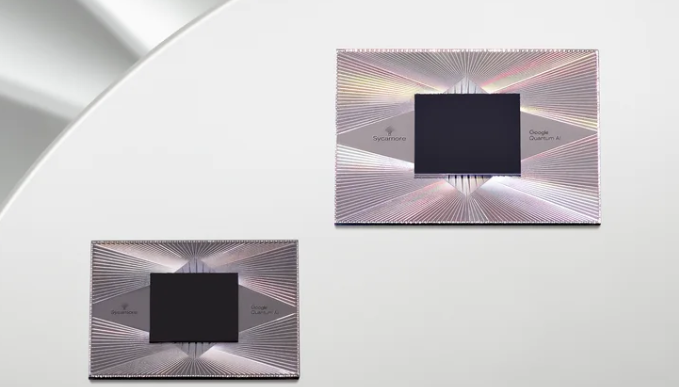 EMERGING TECH
EMERGING TECH
 EMERGING TECH
EMERGING TECH
 EMERGING TECH
EMERGING TECH
Google LLC has achieved a major breakthrough in its efforts to build a quantum computer that can be used for practical applications.
The company said today its discovery will help it to overcome the challenge posed by “quantum errors,” which is one of the major roadblocks in the way of developing a functional quantum computer.
Quantum computers have long been touted as the future of computing thanks to their theoretical ability to make calculations that are extremely difficult or impossible for existing “classical” computers. The challenge is that quantum computers are extremely prone to errors that make their calculations unreliable. But Google claims to have found a way to correct these errors. It says its discovery is a major milestone on the road to creating functional quantum machines.
According to Google Quantum AI researchers, they have discovered a way to reduce error rates in quantum computers exponentially, as the size of the system is increased, enabling them to reach “break-even point.” The company says it’s now confident it will eventually be able to achieve “commercial value” for quantum computers.
The potential of quantum computers stems from their use of quantum mechanics to store data and perform calculations. In a conventional computer, the basic units of information are called bits that are stored as a string of ones and zeroes. However, quantum computers use “qubits” that can be represented by ones and zeroes, or both at the same time. It’s this unique capability that allows them to perform more powerful and complex computations than classical computers.
Although quantum computers should work in theory, progress in developing them has been slow. That’s because they work by manipulating those qubits in an orchestrated fashion, using quantum algorithms. But the qubits are so incredibly sensitive that heat, vibrations, even stray rays of light that can cause them to become unstable and start producing errors.
Until now, the problem has always gotten worse the more powerful a quantum computer becomes. It’s a problem because for quantum algorithms to be effective, they need to use the computational power of lots of qubits. So quantum error correction is necessary to bridge the gap.
Google’s researchers have discovered that it’s possible to suppress quantum errors by scaling a surface code across what’s known as a “logical qubit,” which is a group of several physical qubits that together, become more resistant to errors. Google demonstrated its discovery in a study, where a research team led by Dr. Hartmut Neven, engineering director at Google Quantum AI, created a quantum processors with 72 qubits. The team tested it with two different surface codes. One was applied to 49 physical qubits making up a logical qubit, and the other applied to just 17 qubits. The experiment showed that the larger surface code made from 49 qubits performed much better than the smaller one did.
In a blog post, Google Chief Executive Sundar Pichai said the discovery represents a “significant shift in how we operate quantum computers.” Rather than working on the physical qubits within a quantum processor on a one-by-one basis, it’s treating them as a group, or one logical qubit.
“By encoding larger numbers of physical qubits on our quantum processor into one logical qubit, we hope to reduce the error rates to enable useful quantum algorithms,” he said.
“This is a key breakthrough by Google that aims to improve quantum error correction by bringing multiple, working systems together,” said Holger Mueller of Constellation Research Inc. “Now the challenge is for Google to bring forward commercial use cases for its quantum platforms, as the technology is all about powering next-generation applications.”
Google’s researchers have now published a roadmap for building a useful error-corrected quantum computer with key milestones. Currently, it is building one logical qubit that it plans to scale up in the future:

Pichai said the breakthrough puts Google on the road to developing a quantum computer that will bring “tangible benefits to the lives of millions.” He said the company now believes it’s possible to develop quantum computers that can be used to identify molecules for new medicines, create fertilizer with less energy, discover more sustainable energy sources, and accelerate physics research in ways people have yet to imagine.
Such a day is still some way off ,though, Pichai cautioned. For quantum computing to reach its full potential, Google will need to achieve even more technical milestones to scale quantum machines to the thousands of logical qubits required to fulfill its vision. “There’s a long road ahead — several components of our technology will need to be improved, from cryogenics to control electronics to the design and materials of our qubits,” he said.
Google’s researchers have described their work in more detail in this blog post, and in a paper published in the journal Nature.
Support our mission to keep content open and free by engaging with theCUBE community. Join theCUBE’s Alumni Trust Network, where technology leaders connect, share intelligence and create opportunities.
Founded by tech visionaries John Furrier and Dave Vellante, SiliconANGLE Media has built a dynamic ecosystem of industry-leading digital media brands that reach 15+ million elite tech professionals. Our new proprietary theCUBE AI Video Cloud is breaking ground in audience interaction, leveraging theCUBEai.com neural network to help technology companies make data-driven decisions and stay at the forefront of industry conversations.